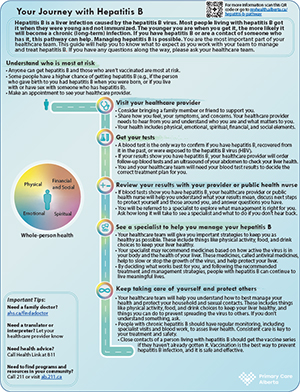Help is available
If you think you might have, or be at risk for, hepatitis B, you might feel scared or embarrassed to talk to your healthcare provider. Your healthcare team won’t judge you. Your healthcare provider knows that hepatitis B can be hard to talk about, and they are there to help and support you.
Healthcare provider’s assessment
Your healthcare provider will ask you questions about your history, activities, and who you are close to. These questions may feel personal. Your healthcare provider is here to support you and give you the best care. Your answers will help them do that.
Testing is the only way to know if you have hepatitis B. Getting tested early is important to help find treatment or prevention strategies to keep you and others healthy and safe.
Getting ready for your appointment
To get ready for your appointment with your healthcare provider:
- If you have symptoms, consider using a
symptom tracker (PDF) to write down important information to share with your healthcare team about your symptoms. A symptom tracker can help you remember how you feel, when symptoms started, how often symptoms happen, and what makes your symptoms better or worse.
- Make a list of your questions and concerns. When you’re done, mark the things that are most important to you.
- Make a list of the prescription and non-prescription (over the counter) medicines you use, including any vitamins, herbs, and supplements.
- Ask someone you trust to go with you to your appointment. They can help you ask questions, write down instructions, and remember explanations.
- Bring a pen and paper and plan to write notes during the visit. Or you can record the conversation using your phone or an app like the Alberta Health Services
My Care Conversations app.
What to watch for (symptoms of concern)
Contact your healthcare team
right away if you have:
- dark, tea-coloured urine (pee)
- severe abdominal (belly) pain
- jaundice (when your skin or the white part of your eyes are yellow)
- high fever
- severe nausea or vomiting
- vomiting blood
- black, tarry stools (called melena), pale or light-coloured stool, or diarrhea
- bloated or swollen abdomen (belly)
- dizziness or confusion
- symptoms of dehydration like dry eyes or mouth, or peeing only small amounts
- swelling of the legs, ankles, and feet
Other things to tell your healthcare provider
You are the most important part of your healthcare team. Tell your healthcare provider what concerns you have about the impact hepatitis B may have on the things that are important to you, like your job, hobbies and interests, and relationships. Let them know if you don’t have the information or understanding of your health conditions to make informed decisions.
Tell your healthcare team if there are things in your life that can impact your ability to manage your health, like:
- problems with money, housing, and transportation
- alcohol or drug use
- not enough support or help
- childhood experiences
- difficulty understanding or speaking English
It’s important to talk about these things with your healthcare team because they all play a role in your health and well-being.
Making the most of your appointment
If you don’t understand what your healthcare team is telling you, let them know right away. Be open and honest. You might say:
- “It sounded like you said that I should… Did I understand that correctly?”
- “Can you show me a picture or model to help me understand?”
Learn more about
working with your healthcare team and
making the most of your appointment.

Hepatitis B Pathway
Download or print the
full patient pathway (PDF) and
summary (one-page PDF) to learn more about how to manage and treat hepatitis B.
Patient Pathway  Summary
Summary 
